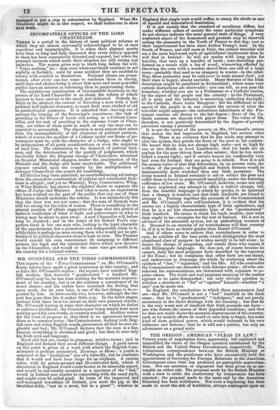INCOMPATIBLE OFFICES OF THE LORD CHANCELLOR.
THERE is a period in the history of most political reforms at which they are almost universally acknowledged to be at once expedient and impracticable. It is when their abstract merits have been so long and fully discussed that every fallacy opposed to them has been successively detected and exposed, but when the personal interests which resist their adoption are still strong and unbroken. The reason gives way to truth long before the will. " Video meliora," &c.: men even when convinced continue to act sinfully or foolishly, until by some accident they are enabled to reform with comfort to themselves. National abuses are perpe- tuated, after every one has come to condemn them in theory, until time and chance bring it about that more and more powerful parties have an interest in reforming than in perpetuating them. The mischievous combination of incompatible functions in the
person of the Lord Chancellor is an abuse, the reform of which appears to have arrived at the epoch just indicated. Nobody de- fends in the abstract the custom of investing a man with a half political half judicial character, as court fools were clothed of old in particoloured garments. It is admitted that—leaving out of account the keeping of the Sovereign's conscience—the task of presiding in the House of Lords and acting as a Cabinet Coun- cillor, and the task of presiding in the supreme Court of Chan- cery, are either of them quite as much as any one man can be expected to accomplish. The objection is more serious that arises from the incompatibility of the character of political partisan, which of course the member of a Cabinet under our frame of go- vernment must be, with the character of a Judge, who ought to be independent of all party considerations, or even the suspicion of such bias. The obstruction to the despatch of judicial busi- ness, and the deterioration of the quality of judgments, which inevitably follow the frequent change of Chancellors attendant on frequent Ministerial changes, render the combination of the Minister and the Judge still more unadvisable. The additional expense entailed upon the country by the multiplication of dowager Chancellors also counts for something.
All this has long been admitted; no counterbalancing advantage from the anomalous combination of judicial and ministerial func- tions is alleged ; and yet no Ministry, Tory, Conservative, Whig, or Whig-Radical, has shown the slightest desire to separate the offices of Judge and Minister. And what is more, no expectation has been evinced on the part of the public that any one of these Ministries should undertake the reform. It was instinctively felt that the time was not yet come ; that the sons of Zeruiah were still too strong for the voice of reason. There is something in the present position of affairs suggestive of hope that this period of imbecile confession of what is right and perseverance in what is wrong may be about to pass away. A new Chancellor will before long be required ; and in the ranks of Sir Robert Peel's sup- porters there is but one man who, looking to the legal character of the appointment, has a prominent and indisputable claim to it, while there is perhaps no man among them who would not be pre- ferable if its political character alone is kept in view. The Premier would consult his own convenience by assigning to different persons the legal and the ministerial duties which now devolve on the Chancellor, and would at the same time get credit from the country for a rational reform.






























 Previous page
Previous page